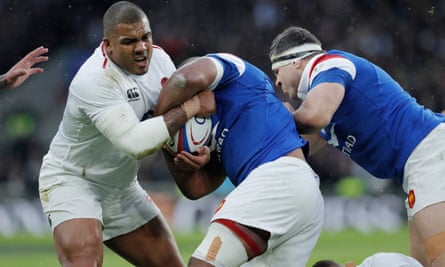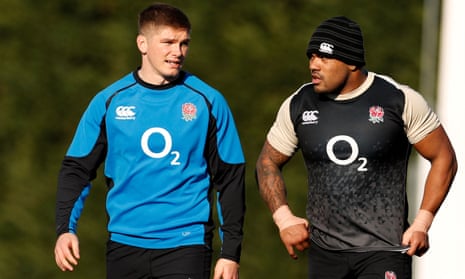Kyle Sinckler is adamant he does not have an anger problem. So adamant that he seems a bit angry about it. Take England’s last match against France. In the second half, Sinckler snapped and slapped the flanker Arthur Iturria on the top of his head. “There’s no need to do it, is there?” the referee, Nigel Owens, told Sinckler after he had given a penalty against him.
A week later, Sinckler says he is still feeling “a bit frustrated about the whole incident”. Owens did not see that Iturria had taken a cheap shot at Sinckler first. “I didn’t just smack him on the head,” Sinckler says. “There was stuff that happened before, but I don’t want to dwell on it.”
Sinckler has said previously: “I only know how to play the game one way – angry.” If he is not careful, his temper will get England into trouble sooner or later. He was lucky Owens did not show him a card.
He knows that next time the referee might not be so generous, or England so far in front, since they were 36 points up when it happened. So he is working on it.
“The big lesson is that I’d done my job in terms of counter-rucking, he lost his cool, and I needed to move on instead of retaliating,” he says. “It’s a good lesson to learn. Just back off.”

It is a good time to learn it too, approaching a crucial match against Wales, when there is sure to be a lot of needle between the teams. The last time England played in Cardiff, in 2017, Sinckler played the last 10 minutes, he remembers that “the atmosphere was electric. The Wales national anthem gets the hairs on the back of your neck standing up just with the passion from the fans.”
England won that one, 21-16. “It’s pretty hostile, as you would expect, but it is all good fun,” he says. “You see all the Welsh flags going in and everyone giving you a bit of abuse, which is good fun.” All of which means, Sinckler says: “I have to make sure I am in control and I don’t let the emotions get the better of me.”
But, at the same time, he does not want to compromise that manic energy of his. “If you are part of the front row and playing in the forward pack it is always going to be a fine line. The main thing is just not letting it get in the way of the main goal which is the team winning.”
That goes back to something Eddie Jones taught him. “He’s got to understand that the team comes before the individual,” Jones said in 2017. “That’ll be the big thing for him.”
Sinckler is on message, here. “We can’t lose sleep over what Wales are going to do. All we are focused on is preparing as best as we can and focusing on our game plan and implementing it.”
He and his teammates seem to be trying very hard to make sure they do not say, or do, anything in the run-up to the match to give Wales any extra motivation. Jones has described this as “the greatest Welsh side ever” and his England players are pretty much refusing to talk about the opposition at all. “We’ll just focus on ourselves,” Sinckler says.
If that is his approach, it has been working for him. In the past year, Sinckler has grown into the player he always had the potential to be. He finally started a match for England when they lost to Ireland last March, and since then has again in nine games out of 10. His hard-charging style, all crashing runs and smashing tackles, helps set the tone for an England team that are playing with ferocious intensity. He has ball skills, too, honed when he was playing in the backs for his old club team Battersea Ironsides, and against France he set up a try for Henry Slade with a pass he delivered from scrum-half. Sinckler has become a gamebreaker. Which is what he wants to be. “I don’t worry about numbers and stats,” he says. “I would rather have six or seven effective tackles rather than 12 soak-up tackles.”
It annoys him, he says, when people talk about how many carries a player has made. “I can get the ball and just drop to the floor and that counts as a carry. Are you running on to the ball with momentum? Are you drawing a defender? Are you denting the line? I would rather have five good carries rather than 15 average ones.
“My focus is not just making 10 carries this week, it is about were the carries effective? Did I manipulate the line? Did I use my hands? Was I running on to the ball?”
Get that right, he says, and everything else will take care of itself.
